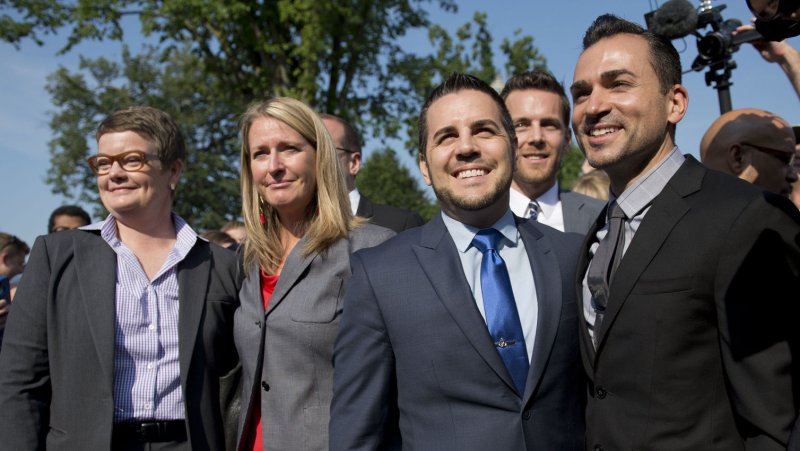1 of 3 | Plaintiffs, from left to right, Kris Perry, Sandy Stier, Jeff Zarrillo and Paul Katami arrive at the Supreme Court in Washington, D.C on, June 26, 2013. The Supreme Court is expected to announce its ruling on California's Proposition 8 ban on same-sex marriage and the federal Defense of Marriage Act. UPI/Kevin Dietsch |
License Photo
WASHINGTON, June 26 (UPI) -- The U.S. Supreme Court by a 5-4 vote Wednesday dismissed a challenge to a ruling that struck down California's law limiting marriage to heterosexuals.
The majority, led by Chief Justice John Roberts, said the challengers did not have "standing" -- could not show they were injured by the lower-court ruling. The opinion crossed ideological lines.
California voters approved Proposition 8, the California Marriage Protection Act, in 2008. The vote was slightly more than 52 percent for, nearly 48 percent against. It overturned a ruling by the California Supreme Court, which itself had overturned an earlier but similar proposition as unconstitutional.
Opponents went to federal court where a federal judge declared Prop 8 unconstitutional. A three-judge appeals court panel in San Francisco agreed 2-1.
Protect Marriage -- its sponsor is a state non-profit, California Renewal -- defended the law since California officials refused to do so, and told the U.S. Supreme Court the appeals court misinterpreted high court precedent.
But Robert's majority opinion said the challengers did not have standing to appeal the U.S. District Court judge's order. "Article III of the Constitution confines the judicial power of federal courts to deciding actual 'cases' or 'controversies,'" Roberts said. "One essential aspect of this requirement is that any person invoking the power of a federal court must demonstrate standing to do so. In other words, the litigant must seek a remedy for a personal and tangible harm."
The challengers "had not been ordered [by the judge] to do or refrain from doing anything," Roberts said. "Their only interest was to vindicate the constitutional validity of a generally applicable California law. As this court has repeatedly held, such a 'generalized grievance' -- no matter how sincere -- is insufficient to confer standing."
Roberts was joined in his opinion by conservative Justice Antonin Scalia and liberal Justices Ruth Bader Ginsburg, Stephen Breyer and Elena Kagan. Conservative Justices Anthony Kennedy, Clarence Thomas and Samuel Alito, and liberal Justice Sonia Sotomayor, dissented.















